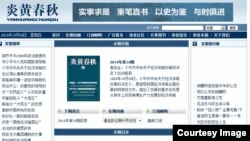A long running Chinese liberal magazine says it will now be taken over by Beijing's government in a move that continues a tightening grip on information since President Xi Jinping came to power.
Yanhuang Chunqiu, or "China Through the Ages", known for its outspoken and critical style, recently announced a new president and vice president, both of whom are sons of former Communist Party leaders.
Yanhuang Chunqiu was founded in 1991, and most of its editors and authors are senior cadres or scholars from the Communist Party. Over the course of its history, it has covered a number of sensitive political issues earning it a reputation as a base camp for liberal forces within the Party.
According to reports, the magazine received a formal notification in September that it will be taken over by the Chinese National Academy of Arts, which reports directly to the Ministry of Culture. The notice mentioned leadership changes must be done within two months.
Du Daozheng, current president of the magazine, confirmed subsequently if the magazine refused to be merged, it would be shut down.
Hu Deping, son of deceased CPC General Secretary Hu Yaobang, and Lu De, son of former deputy premier Lu Dingyi, will now serve as president and vice president of the magazine, which may increase its chances of survival because Hu is widely considered to have a close personal relationship with President Xi.
Du Daozheng told VOA the main reason behind asking them to take over is to leverage their political connections and influence to enhance the magazine’s political bargaining power and defend its independence. “People are more respect[ful] to high officials, especially sons of Hu Yaobang and Lu Dingyi. For political consideration, they are very influential," he said.
The sudden leadership change of Yanhuang Chunqiu could be another indicator of increased government and party control over information in the past two years. But the magazine's outgoing vice president, Yang Jisheng, says that campaign may not be a bad thing.
"The country is facing too many problems and a lot of domestic problems have been accumulated over the years. Xi Jinping wants to do things after he came to power but is afraid his efforts will be decentralized and affected by public opinions," Yang said.
The editorial board said it will not change the editorial policy.
Sun Wenguang, a retired professor of Shandong University, told Radio Free Asia that he believes the move shows a strengthened pressure on outspoken media.
But Du Daozheng remains optimistic about the future of Yanhuang Chunqiu.
“China's situation is very complicated, there are people [who] support us, there are also some against us, and some observe from the sidelines. I think now strength from supporters is larger. I predict there are a lot of leaders in the Party are in support of this magazine. For Xi Jinping, as the main leader, I think he supports our magazine at heart.”
Mao Wei Wei also contributed to this report, which was produced in collaboration with the VOA Mandarin service.





